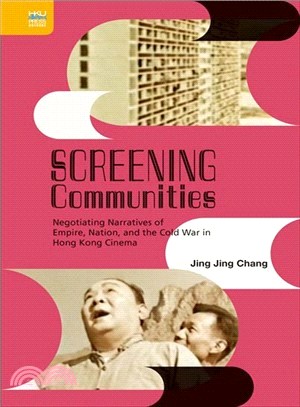| FindBook |
有 5 項符合
Screening Communities:Negotiating Narratives of Empire, Nation, and the Cold War in Hong Kong Cinema的圖書 |
 |
Screening Communities:Negotiating Narratives of Empire, Nation, and the Cold War in Hong Kong Cinema 作者:Jing Jing Chang 出版社:香港大學出版社 出版日期:2019-03-29 規格:23.6cm*15.8cm*1.9cm (高/寬/厚) / 精裝 / 256頁 |
| 圖書選購 |
| 型式 | 價格 | 供應商 | 所屬目錄 | $ 1548 |
藝術設計 |
$ 1548 |
Arts & Photography |
$ 1764 |
電影評論 |
$ 1822 |
中文書 |
$ 1823 |
電影 |
|---|
| 圖書館借閱 |
| 國家圖書館 | 全國圖書書目資訊網 | 國立公共資訊圖書館 | 電子書服務平台 | MetaCat 跨館整合查詢 |
| 臺北市立圖書館 | 新北市立圖書館 | 基隆市公共圖書館 | 桃園市立圖書館 | 新竹縣公共圖書館 |
| 苗栗縣立圖書館 | 臺中市立圖書館 | 彰化縣公共圖書館 | 南投縣文化局 | 雲林縣公共圖書館 |
| 嘉義縣圖書館 | 臺南市立圖書館 | 高雄市立圖書館 | 屏東縣公共圖書館 | 宜蘭縣公共圖書館 |
| 花蓮縣文化局 | 臺東縣文化處 |
|
|
Postwar Hong Kong cinema played an active role in building the colony’s community in the 1950s and 1960s. To Jing Jing Chang, the screening of movies in postwar Hong Kong was a process of showing the filmmakers’ visions for Hong Kong society and simultaneously an attempt to conceal their anxieties and mask their political agenda. It was a time when the city was a site of intense ideological struggles among the colonial government, Chinese Nationalists, and Communist sympathizers. The medium of film was recognized as a powerful tool for public persuasion and various camps competed to win over the hearts and minds of the audience. Screening Communities thus situates the history of postwar Hong Kong cinema at the intersection of Cold War politics, Chinese culture, and local society.
Focusing on the genres of official documentary film, leftist family melodrama (lunlipian), and youth film, this study examines the triangulated relationship of colonial interventions in Hong Kong film culture, the rise of left-leaning Cantonese directors as new cultural elites, and the positioning of audiences as contributors to the colony’s journey toward industrial modernity. Filmmakers are shown having to constantly negotiate changing sociopolitical conditions: the Hong Kong government presenting itself as a collaborative ruling body, moral and didactic messages being adapted for commercial releases, and women becoming recognized as a driving force behind Hong Kong’s postwar industrial success. In putting forward a historical narrative that privileges the poetics and politics of shaping a local community through a continuous screening process, Screening Communities offers a new interpretation of the development of Hong Kong cinema—one that breaks away from the usual accounts of the “rise and fall” of the industry.
作者簡介:
Jing Jing Chang is associate professor of film studies at Wilfrid Laurier University, Canada. She has written articles on such topics as celebrity culture and Cold War politics in postwar Hong Kong cinema. Her current research explores the sexual politics of Hong Kong cinema since the 1970s.
|











